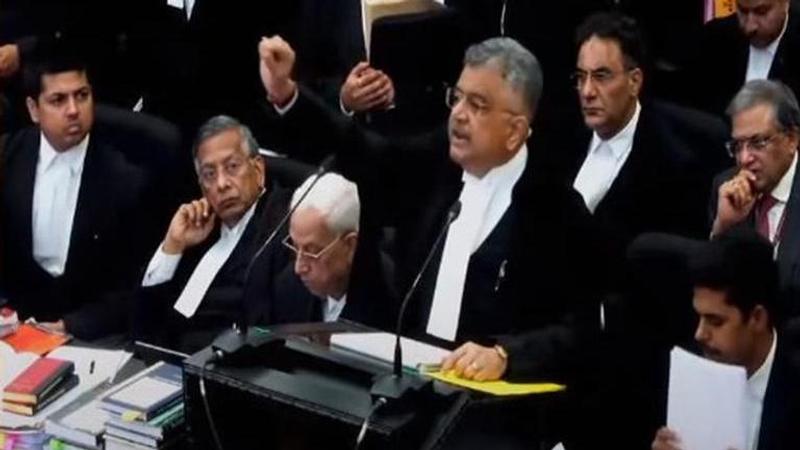Published 13:20 IST, August 29th 2023
'Any change in Constitution that brings everyone at par...': SG on Article 370 abrogation
A batch of petitions contesting the removal of Jammu and Kashmir's special status are being heard by a Constitution bench headed by the CJI.

Any change in the Constitution that brings everyone at par can never be faulted with, said Solicitor General of India, Tushar Mehta, while presenting the Centre's arguments in favour of the abrogation of Article 370 on the 12th day of hearing, Tuesday. SG Mehta was referring to Raghunathrao Ganpatrao v. Union Of India (1993) case.
"In this case (Raghunathrao Ganpatrao v. Union Of India), the court said that any change in the Constitution which brings everyone at par can never be faulted with. Princely states, after formation of Constitution, lost their special privilege and the word 'fraternity' had to be given meaning," the Solicitor General said.
While initiating his arguments, Mehta provided a brief outline of his submissions before the bench. He said his arguments will majorly focus on three points — Article 370’s interpretation, J&K Reorganisation Act, 2019, and the parameters of powers of legislature during President’s Rule (Article 356).
The petitions contesting the removal of Jammu and Kashmir's special status are being heard by a Constitution Bench consisting of Chief Justice of India DY Chandrachud, and Justices SK Kaul, Sanjiv Khanna, BR Gavai, and Surya Kant.
Arguing before the Constitution bench, SG Mehta said: "If I start with (Article) 370, some of the arguments on the other side were that there was an assurance given to princely states as a result of which they joined India and Article 370 is a result of that.”
“This happened first in the case of Madhavrao Scindia - the govt withdrew privy purses. There were two constitutional provisions- Article 291 and 362 which provided for privy purses. Central government exercised powers under 366 and deleted the term 'princely states'. This court allowed that petition and said that so long as these two provisions exist, you cannot take away privy purses by merely changing Article 366 which is the definition clause. After the judgment in Madhavrao Scindia, there was a constitutional amendment. The government repealed it. So the route was taken. That came to be challenged and the matter went to be challenged in Raghunathrao Ganpatrao v. Union Of India (1993),” Mehta said.
The Supreme court had ruled in Raghunathrao Ganpatrao v. Union Of India (1993) case that any change in the Constitution that brings everyone at par can never be faulted with, the Solicitor General argued adding that princely states, after formation of the Constitution, lost their special privilege and the word 'fraternity' had to be given meaning, the SC stated in 1993.
SG Tushar Mehta (while reading from SC’s Raghunathrao judgement), stated, "A serious argument has been advanced that the privy purse was a just quid pro quo to the Rulers of the Indian States for surrendering their sovereignty and rights over their territories; This argument based on the ground of breaking of solemn pledges and breach of promise cannot stand much scrutiny."
"To say that without voluntary accession, India would be different from that Bharat that came into being prior to the accession is untenable; One should not lose sight of the fact that neither 'cause of their antipathy towards Rulers nor due to any xenophobia, did the Indian Govt entertain the idea of the integration but because of the will of the people. It was the people who were instrumental in integration."
August 29 marks the 12th day of hearing by the apex court on pleas challenging the abrogation of Article 370. CJI Chandrachud on Monday said that fundamental rights of the people of Jammu and Kashmir were taken away by implementing Article 35A. Article 35A gave the state legislature the power to define the ‘permanent residents’ of the state and provide them with special privileges and denying other people with fundamental rights.
The CJI heading the Constitutional Bench observed that, “Article 35A gave special rights and privileges to permanent residents and virtually took away the rights of non-residents. These rights included the right to equal opportunity of State employment, right to acquire property and the right to settle in Jammu and Kashmir,”
During the hearings, Solicitor General Tushar Mehta emphasised that Jammu and Kashmir witnessed the application the Preamble of the Indian Constitution sans the phrases "socialist" and "secular." He added that the Valley has seen an increase in investments and visitors since the abrogation of the Article 370.
The former State of Jammu and Kashmir was divided into two Union Territories on August 5, 2019, after the Centre decided to revoke its special status. Several petitions against the repeal of Article 370's provisions and the Jammu and Kashmir Reorganisation Act, 2019, were sent to a Constitution Bench in 2019.
Updated 13:21 IST, August 29th 2023




